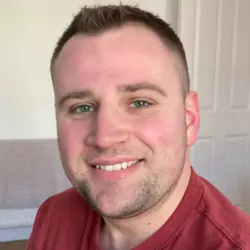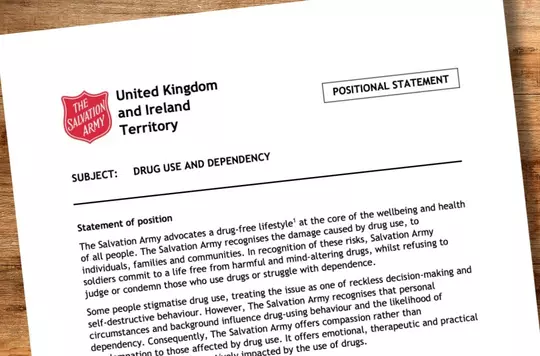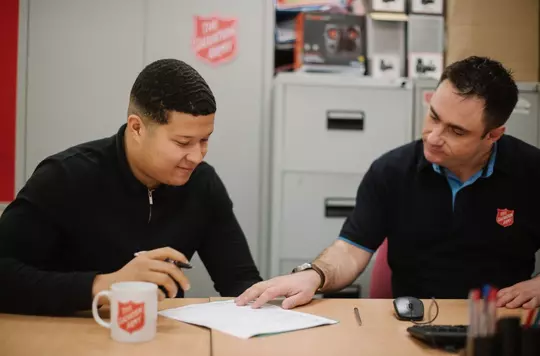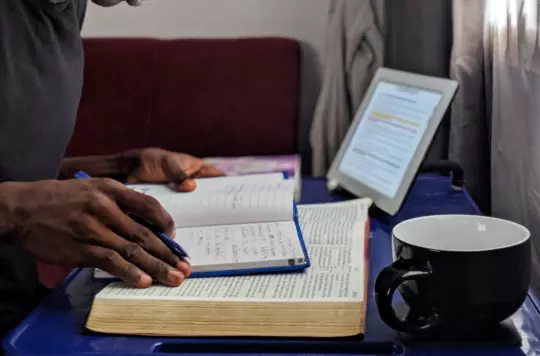13 February 2025
‘It helped me see the whole person’
George Tanton

Community Manager Simon Fenn (Sheringham) tells George Tanton how addictions training helped him help others.
As representatives of The Salvation Army, it’s important for us to show love and understanding to everyone we serve, including people who live on the fringes of our communities. Someone you may see living with an addiction, for example, is not to be vilified. They could be someone’s father, mother, brother, sister, son or daughter. The Addictions Department’s training for corps helps us see them as more than their trauma or addiction.
The training is a trauma-informed programme provided in partnership with Community Services and the Core Recovery team. Previously focused on supporting staff in Lifehouses, the programme is now open to colleagues in corps and centres across the territory.
Taught across nine modules, the sessions focus on potential root causes of addiction, such as adverse childhood experiences, as well as intervention methods.
Simon was a member of last year’s training cohort.
‘I think this training should be mandatory for all corps,’ he asserts. ‘We’re a frontline service. Consequently, we’re never quite sure who will walk through the door, particularly in relation to addiction or mental health issues.’
While the subject matter can be hard-hitting, it’s taught in a supportive and sensitive environment, encouraging self-care, wellbeing and mutual respect between learners.
‘The course is quite emotionally challenging because of the stuff you talk about,’ Simon explains. ‘It can be triggering for some individuals.’
One module covers emotional regulation, which entails how to keep all communication safe for every party involved.
‘It allows you to make a better-informed choice about signposting an individual to the relevant service, while ensuring good, professional boundaries,’ says Simon.
The aim of the course it to come away with a greater confidence to minister to people struggling with deep trauma and addiction issues.
‘It’s important for us to understand the people who come through our doors,’ Simon continues. ‘People are like icebergs, and you initially only see the tip – the presenting issue.
‘We do have people who access our services who have addictions, whether it’s drugs or alcohol or maybe gambling. The training allows us to understand them and their triggers better and provide a more robust and holistic service.
‘It helps us see past the initial issue an individual is presenting with and see the whole person rather than just the addiction. I found it incredibly useful and empowering.’
Simon credits the course with helping to change thinking around addictions. For example, he highlights how outdated language can unintentionally vilify someone: ‘Language is really important. Rather than calling a person who has stopped using heroin an “ex-addict”, we would say they are a “person who has stopped using heroin”. It’s about maintaining the dignity of the people we serve. This goes back to our mission priority of serving others without discrimination.’
‘We talked about conscious and unconscious bias as well,’ he continues. ‘If you’re aware of your unconscious bias, it helps you to go “maybe I need to rethink this and not judge that person”.
‘The training gets you to ask: “Why is someone using drugs and alcohol to deal with this trauma?” That trauma might be undiagnosed. They could be vulnerable. They might be doing something that brings them into harm to feed the addiction. They are a victim in this. They need our love and our care. You can gain that understanding by doing this course.’
- This year’s first session begins on 25 February. For more information and to register to join, email addictionservice@salvationarmy.org.uk.
Written by

George Tanton
Editorial Assistant
Discover more

Major Will Pearson talks to Salvationist about the territory’s new positional statement on drug use and dependency.

Mitch Menagh (THQ) unpacks the serve others without discrimination mission priority.

Core Recovery is a model of church that has grown out of our work supporting people with addictions.
